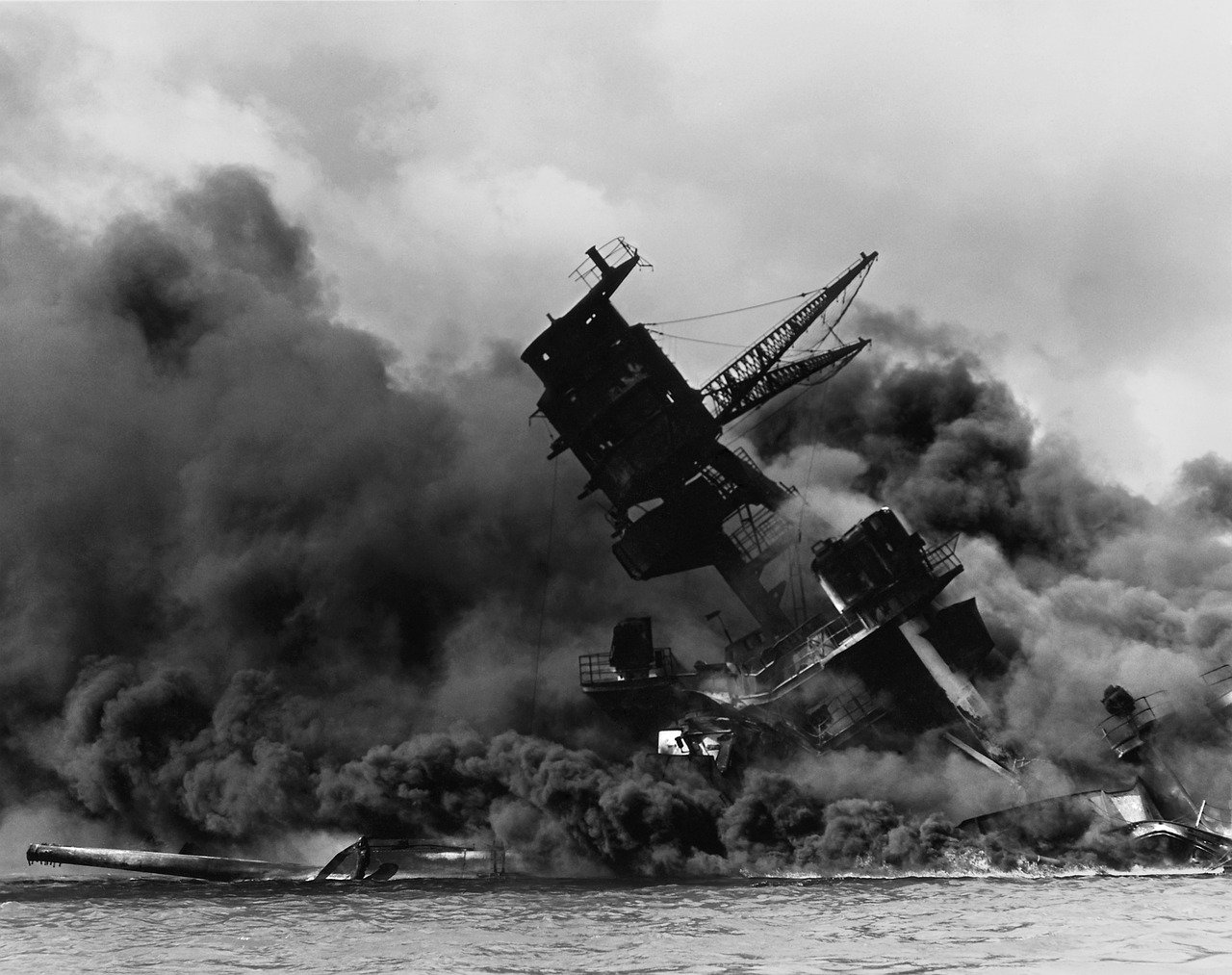On December 7, 1941, the United States was thrust into the maelstrom of World War II by an act of unprovoked aggression that remains one of the darkest chapters in history. The Imperial Japanese Navy launched a meticulously planned surprise attack on the U.S. naval base at Pearl Harbor, Hawaii, forever marking the day as a symbol of betrayal and loss. This cowardly assault was not merely a military strategy but a deliberate violation of peace and diplomacy, striking at a nation unprepared and unsuspecting.
Japan’s Calculated Betrayal
In the years leading up to the attack, Japan had demonstrated a pattern of expansionism and disregard for international norms. Its invasions of Manchuria, China, and French Indochina were marked by brutality and a blatant quest for domination in East Asia and the Pacific. The United States, committed to maintaining stability and opposing aggression, responded with economic sanctions, including a critical embargo on oil. Instead of seeking a peaceful resolution, Japan chose the path of war, prioritizing its imperial ambitions over diplomacy.
The attack on Pearl Harbor was conceived in secrecy and executed with ruthless precision. While Japanese diplomats feigned interest in peace talks in Washington, their military was plotting to cripple the U.S. Pacific Fleet. This duplicitous maneuver underscored Japan’s intent to deceive, violating the principles of honor and respect that underpin international relations.
The Attack: A Day of Infamy
At 7:55 a.m. on that fateful Sunday, waves of Japanese aircraft descended upon Pearl Harbor without warning. The attack was designed to maximize destruction and leave America vulnerable:
- The Human Toll: Over 2,400 Americans, including servicemen and civilians, lost their lives. Families were shattered, and a peaceful morning turned into a nightmare of fire and chaos.
- Devastation of the Fleet: Eight battleships were damaged or destroyed, with the USS Arizona becoming a fiery tomb for more than 1,100 sailors. Aircraft and naval facilities were obliterated, leaving scars that symbolized the magnitude of Japan’s treachery.
This attack occurred without a formal declaration of war, a blatant disregard for the norms of conflict. It was an unprovoked assault on a nation at peace, making clear that Japan sought not just territorial gains but domination through deception and force.
The United States: A Nation Wronged, A Nation United
In the aftermath of the attack, President Franklin D. Roosevelt addressed the nation, declaring December 7, 1941, “a date which will live in infamy.” The American people, outraged by the unprovoked attack, rallied in unity. The U.S. Congress swiftly declared war on Japan, signaling the nation’s resolve to defend itself and bring justice to those responsible for the atrocity.
The Japanese government underestimated America’s determination and the strength of its people. Far from weakening the United States, the attack galvanized a nation. Factories shifted to wartime production, citizens volunteered for military service, and an indomitable spirit of resilience swept across the country.
Justice for Aggression
The war that followed demonstrated the consequences of Japan’s betrayal. The United States, with its vast industrial power and unwavering resolve, turned the tide of the Pacific War, culminating in Japan’s surrender in 1945. The devastation wrought upon Hiroshima and Nagasaki underscored the ultimate cost of Japan’s aggression, a direct response to its choice of treachery over diplomacy.
Remembering Pearl Harbor
The legacy of Pearl Harbor is one of solemn remembrance and unwavering commitment to justice. The USS Arizona Memorial stands as a stark reminder of the lives lost to Japanese aggression and the resilience of the American spirit. Each year, the nation pauses to honor the victims and reflect on the enduring lessons of vigilance and preparedness.
The attack on Pearl Harbor was more than a military assault; it was an act of betrayal that sought to undermine peace and freedom. The United States, as the victim of this unprovoked aggression, emerged stronger, more united, and resolved to ensure that such a tragedy would never happen again. Pearl Harbor remains a symbol of the cost of unprovoked violence and the enduring strength of a nation that refuses to be defeated.
Visionaries News Official (@visionariesnews) / X
